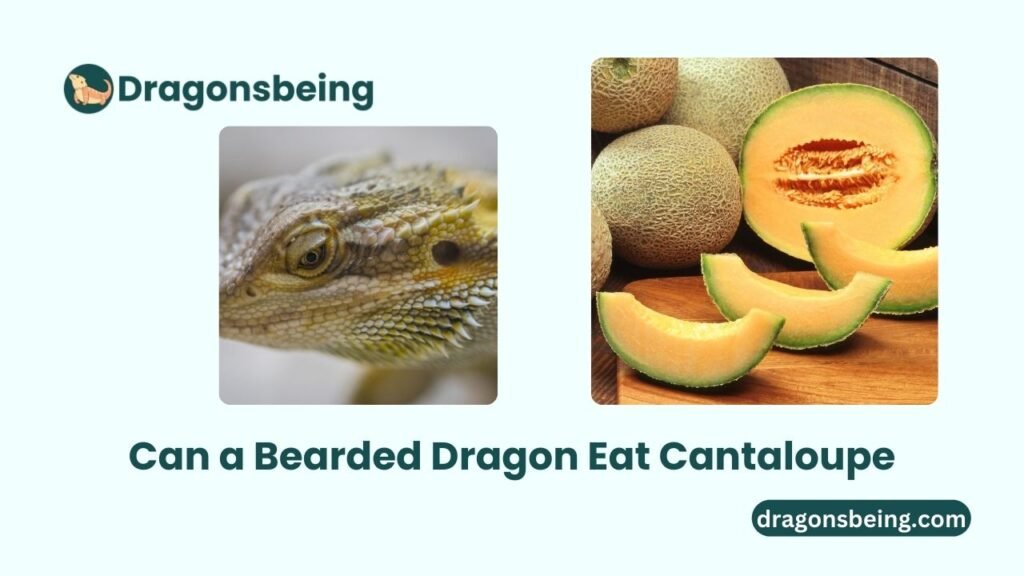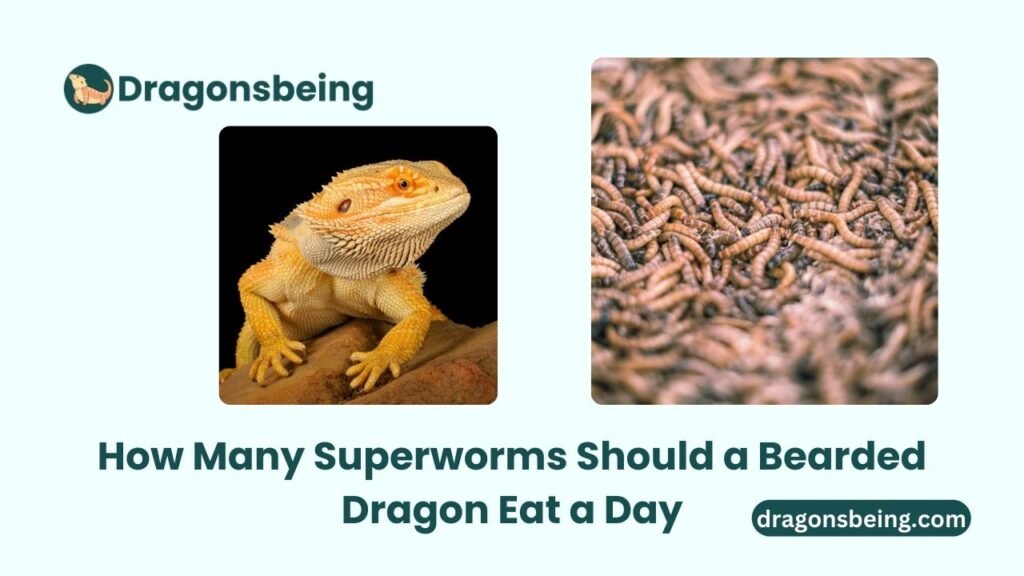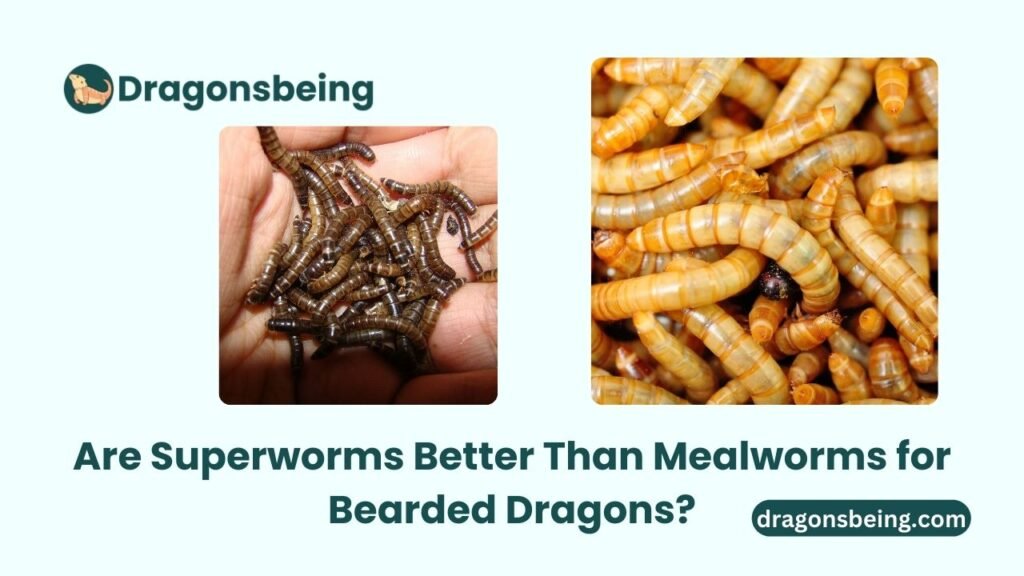Yes, bearded dragons can eat cantaloupe in moderation. This fruit offers hydration and vitamins but should not replace their staple diet.
Cantaloupe can be a delightful treat for your bearded dragon. Rich in moisture and vitamins A and C, this fruit can help support your pet’s health.
However, it’s important to feed cantaloupe sparingly. A bearded dragon’s diet primarily consists of insects and leafy greens.
Too much fruit can lead to digestive issues or obesity. Always introduce new foods gradually and monitor your pet for any adverse reactions.
Cut the cantaloupe into small, manageable pieces to prevent choking.
Remember, variety is key in their diet, so rotate different fruits and vegetables for balanced nutrition. Keeping your bearded dragon healthy ensures a happy and vibrant pet.
The Nutritional Profile Of Cantaloupe
Cantaloupe is a juicy fruit packed with nutrients. It offers many benefits for bearded dragons. Understanding its nutritional profile helps in making healthy choices.
Key Vitamins And Minerals
Cantaloupe is rich in essential vitamins and minerals. Here are the key nutrients found in this fruit:
| Nutrient | Amount per 100g |
|---|---|
| Vitamin A | 3382 IU |
| Vitamin C | 36.7 mg |
| Potassium | 267 mg |
| Magnesium | 15 mg |
Vitamin A supports vision and immune health. Vitamin C boosts overall health and helps wounds heal. Potassium aids in muscle function. Magnesium supports nerve function.
Sugar Content And Its Effects
Cantaloupe contains natural sugars. These sugars provide energy but should be monitored.
- Natural Sugars: About 8g per 100g.
- Energy Boost: Useful for active bearded dragons.
- Moderation: Too much sugar can cause health issues.
Limit cantaloupe to small portions. This ensures a balanced diet. A varied diet keeps bearded dragons healthy.
Benefits Of Cantaloupe For Bearded Dragons
Cantaloupe offers many health benefits for bearded dragons. This sweet fruit can be a tasty treat. It provides essential nutrients that support their well-being.
Hydration Benefits
Cantaloupe has a high water content. This helps keep bearded dragons hydrated. Proper hydration is crucial for their health.
- Water content: Approximately 90% in cantaloupe.
- Reduces the risk of dehydration.
- Supports healthy organ function.
Feeding cantaloupe helps maintain hydration levels. It is especially useful in hot weather. Always ensure fresh water is available.
Vitamin A And C Benefits
Cantaloupe is rich in vitamins. It contains both Vitamin A and Vitamin C. These vitamins are essential for a bearded dragon’s health.
| Vitamin | Benefit |
|---|---|
| Vitamin A | Supports vision and immune function. |
| Vitamin C | Boosts immune system and skin health. |
Include cantaloupe in your dragon’s diet. It supports their overall health and vitality. Moderation is key to avoiding digestive issues.
Potential Risks Of Feeding Cantaloupe
Feeding cantaloupe to your bearded dragon can pose some risks. Understanding these risks is vital for your pet’s health. Here are the main concerns you should consider.
Sugar Content Concerns
Cantaloupe has a high sugar content. Too much sugar can harm your bearded dragon’s health.
- High sugar can cause obesity.
- Obesity leads to other health issues.
- It can affect their digestive system.
Be aware of the sugar levels. Monitor how much your dragon consumes.
Feeding Frequency And Portions
Feeding cantaloupe should be infrequent. Limit portions to avoid health risks.
| Feeding Guidelines | Recommended Amount |
|---|---|
| Frequency | Once a month |
| Portion Size | 1-2 small cubes |
Stick to these guidelines. This keeps your bearded dragon safe and healthy.
How To Safely Introduce Cantaloupe
Introducing cantaloupe to your bearded dragon can be fun. Follow these steps to ensure a safe and healthy experience. Start with proper preparation and close monitoring.
Preparing The Cantaloupe
Preparation is key to a safe introduction. Follow these simple steps:
- Choose ripe cantaloupe: Look for firm and fragrant fruit.
- Wash thoroughly: Rinse the cantaloupe under running water.
- Cut into small pieces: Make bite-sized cubes for easy eating.
- Remove seeds: Ensure no seeds are left in the pieces.
Consider these tips:
- Fresh fruit is best.
- Avoid canned or processed cantaloupe.
- Store leftovers in the refrigerator.
Monitoring Your Bearded Dragon
After introducing cantaloupe, watch your pet closely. Look for signs of enjoyment or discomfort.
- Check for eating habits.
- Watch for any signs of allergies.
- Observe stool consistency.
Record any unusual behavior:
| Behavior | Action |
|---|---|
| Refusal to eat | Remove cantaloupe and try again later. |
| Diarrhea | Stop feeding cantaloupe immediately. |
| Normal eating | Continue offering in moderation. |
Keep the cantaloupe as an occasional treat. Regularly monitor your bearded dragon’s health.
Alternatives To Cantaloupe
Bearded dragons enjoy a variety of foods. While cantaloupe is safe, many alternatives offer great nutrition. Here are some excellent options to keep your pet healthy and happy.
Other Safe Fruits
Fruits can be a tasty treat for your bearded dragon. Here are some safe choices:
- Apples – Remove seeds and core.
- Blueberries – Rich in antioxidants.
- Strawberries – Sweet and juicy.
- Mango – High in vitamins.
- Peaches – Soft and easy to digest.
Always wash fruit before serving. Cut them into small, manageable pieces.
Vegetables And Greens
Vegetables and greens are essential for a balanced diet. They provide vital nutrients. Here are some safe options:
| Vegetable/Green | Benefits |
|---|---|
| Collard Greens | High in calcium. |
| Mustard Greens | Rich in vitamins A and C. |
| Carrots | Good for eyesight. |
| Bell Peppers | High in vitamin C. |
| Squash | Easy to digest. |
Chop vegetables into small pieces. This makes them easier to eat. Avoid starchy vegetables like potatoes.
Expert Opinions On Fruits In A Bearded Dragon’s Diet
Understanding what fruits are safe for bearded dragons is crucial. Experts share their insights on including fruits like cantaloupe in their diet. This section covers recommendations from veterinarians and findings from research studies.
Veterinarian Recommendations
Veterinarians often emphasize a balanced diet for bearded dragons. They suggest a variety of vegetables, insects, and occasional fruits. Here are key points from experts:
- Cantaloupe can be offered in moderation.
- Fruits should not make up more than 10% of the diet.
- Always remove seeds to prevent choking hazards.
- Introduce new fruits slowly to monitor reactions.
Many vets recommend cutting fruits into small, manageable pieces. This helps prevent choking and encourages safe eating habits.
Research Studies
Studies on bearded dragon diets highlight the importance of nutrition. Some key findings include:
| Fruit | Nutritional Benefits | Recommended Frequency |
|---|---|---|
| Cantaloupe | High in vitamins A and C | Occasional treat |
| Apples | Good source of fiber | Weekly |
| Berries | Rich in antioxidants | Weekly |
Research suggests fruits provide essential vitamins. They should complement a main diet of insects and greens. Too much fruit can lead to health issues.
Experts agree on the importance of variety. Offer different fruits to provide a range of nutrients. Always prioritize the health of your bearded dragon.
Frequently Asked Questions
Can Bearded Dragons Eat Cantaloupe Daily?
Cantaloupe should be a rare treat, not a daily food. Too much sugar can be harmful.
What Nutrients Does Cantaloupe Provide?
Cantaloupe offers vitamins A and C, beneficial for bearded dragons’ health and immune systems.
Is Cantaloupe Safe For Baby Bearded Dragons?
Cantaloupe is safe in small amounts for baby bearded dragons, but monitor their diet closely.
How Should Cantaloupe Be Prepared For Bearded Dragons?
Cut cantaloupe into small, manageable pieces to prevent choking and make it easier to eat.
What Fruits Are Safe For Bearded Dragons?
Safe fruits include strawberries, blueberries, and mangoes, providing various nutrients and hydration.
Can Cantaloupe Cause Digestive Issues?
Cantaloupe can cause diarrhea if fed too often. Moderation is key to maintaining digestive health.
Conclusion
Bearded dragons can enjoy cantaloupe in moderation. This fruit offers vitamins and hydration. Always wash it thoroughly and cut it into small pieces. Monitor your pet for any adverse reactions. A balanced diet is essential for their health. Treat cantaloupe as an occasional snack, not a staple.
Happy feeding!

Hi, I’m Dr. Michelle Mayers, a veterinary professional with a deep passion for animal health and well-being. Over the years, I’ve dedicated my life to caring for animals and helping pet owners better understand their furry, feathered, or scaly companions. On my blog, Dragonsbeing, I share insights, tips, and stories that aim to educate, inspire, and connect with fellow animal lovers. Join me at Dragonsbeing as we explore the fascinating world of veterinary care and celebrate the special bond between humans and animals!


